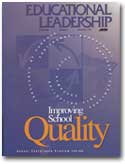“Ain't gonna study war no more”—a beautiful thought from an old gospel song. Unfortunately, the thought is as unrealistic in the new world as it was in the bad old days of the Cold War. The skills of the warrior are still needed.
Just as well-rounded education must include history, well-rounded history must include the study of war. This is why the writer must answer Colman McCarthy (“Why We Must Teach Peace,” September 1992) with “I agree but...”
It was our ideas, not our defense budget, that provided the inspiration for unforgettable moments such as the East Berlin citizens dancing on top of the Berlin Wall. It was the philosophy of Jefferson, not that of Patton, that inspired the Velvet Revolution in Prague. But it was our missiles, bombers, submarines, and tanks that kept the peace along the aptly named “Central Front” in Europe—however badly they performed elsewhere in the world—and removed war as an option for the Communist bloc.
Peace studies certainly should be a part of the educational process. Why was peace so often rejected in the past? What can we do to change this in the future? But war should also be studied in all its phases, from the proverbial “road to war” through the political and military aspects of war, and post-war. All too often the issues leading to war tend not to be settled by the war but to fester and simmer until becoming at least part of the cause of the next war. To paraphrase McCarthy: With so much practice, why is war so ineffective?
We cannot forget that war is combat. Understanding war, to the degree it can be understood, means studying even the actual fighting. Bloodshed is what happens when war is not avoided, with errors and mistakes exacting their unavoidable costs.
We have to try to understand one of the most disturbing, yet fascinating, aspects of war. Despite its incredible horrors, there is great gallantry, creativity, and humanity, even actual glory, in war. Whoever said that war brings out the best and the worst in human beings was correct. The study of military history is a look into basic human characteristics. It helps us seek common factors for how and why war gives people such an opportunity to rise above the mundane. How can this be done without the horrible cost? How can we get the best without the worst?
Despite the end of the Cold War, perhaps even because of the end of the Cold War and the restraints imposed on the rest of the world by competition among nuclear-armed superpowers, understanding how wars start, and how they might be prevented, has become even more important for effective citizenship. Effective citizens must know the degree to which “the road to war” is one of the most accurate clichés around. When a country gets into a war, it is like the country travels down a road, ignoring forks in the road, alternate routes to settlement and peace. It is like the “fog of war” exists even before the war starts. Finally, a nation gets to the point where only two roads exist—surrender of principles and interests, if not the nation itself, or war. This happened in the Gulf War, in the Civil War, and in World War II. Americans may well find themselves on such a road again. We have to be able to recognize the turn-off signs before it is too late to seek alternative roads to the peaceful settlement Colman McCarthy, and the rest of us, prefer. If we are to learn from the past, we have to understand the whole past.
“War is one of the constants of history, and has not diminished with civilization and democracy. In the last 3,421 years of recorded history, only 268 have seen no war.”
Things have not fundamentally changed since 1968, when the Durants wrote these words. We must study peace, but if we don't study war, we ignore something unfortunate and highly undesirable, yet an overwhelmingly substantial part of human history. War, which diminishes humanity, must be a part of the study of humanity's history.
